For anyone who is fascinated by the concept of getting into beach metal detecting, there is a lot for you to think about. Metal detecting on its own can be quite an easy thing to get started with; you just need to know where to look, to begin with.
One of the most confusing aspects of metal detecting, for example, comes from the terrain you are detecting on top of. If you try and use a metal detector that is not made for a specific ground style, it can lead to poor results – or even a complete lack of results. That’s why if you are looking to get into metal detecting on the beach, in particular, it pays to know what to expect.
Getting Started
For most of us, the challenge stems from making sure we pick the right kind of metal detector. A metal detector that works well on soil and/or concrete, for example, might not be so suited to the natural intensity and density of a beach. That’s why if you intend to get into this particular act of metal detecting then it would be wise indeed to read on.
From making sure that you can pick out the right kind of metal detector to improving your chance of finding something, in particular, it can all feel so challenging. Where do you even start if you want to make this work?
And while that can seem needlessly confusing, to begin with, it does not have to be this way. With our beginners’ guide to beach metal detecting, you can start seeing the difference between handling metal detecting on a normal surface and handling metal detecting on the beach.
With our beginners’ guide, though, you should have a much clearer idea of what to do.
The Basics of Beach Metal Detecting
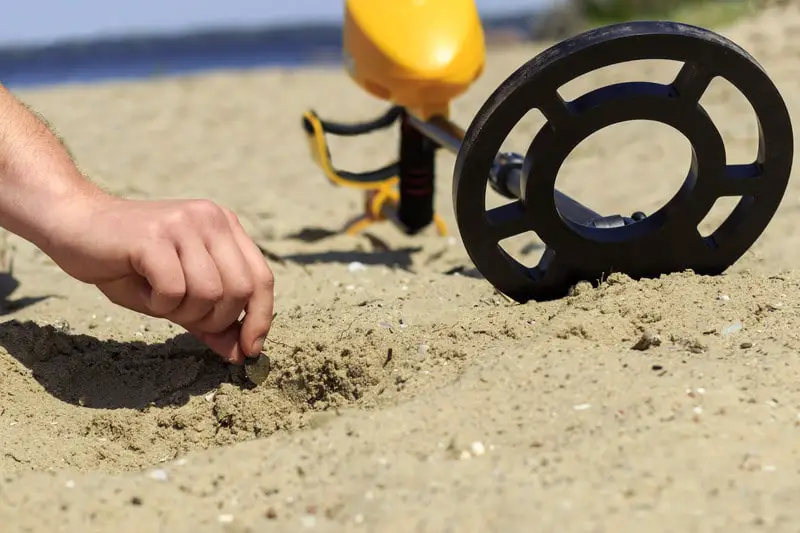
So, just like buying anything else in the world of metal detecting, one thing you will need to focus on is buying the right metal detector. We’re going to break down the specific nature of buying for the beach shortly, but for now, you should be asking yourself the following questions regarding buying a beach metal detector:
- What kind of metal detector am I going to need if I want to go down to the beach?
- What will I even be searching for when I choose to go and search down at the beach?
- What kind of beach will you be dealing with? Is this a wet beach? Or a dry beach?
- Where does your experience in metal detecting come from? Do you have any experience?
- How long can you spend on any given day metal detecting? Is this a rare or regular hobby?
- How much money can you realistically afford to spend on a new metal detector?
- Are you willing to donate more time than you would have expected to the art of metal detecting?
- How much help will you need from metal detecting hardware to help you make the right calls?
All of these questions are very important to answer, as they will play a key role in making sure you can pick out the right kind of information and details. This is a big reason why we recommend that you look to answer all of the queries above before you go any further.
If you can find a legitimate answer then you should find it much easier to go through with beach metal detecting. Is it tough? Yes, it can be. However, it can be made much easier if you focus on having an answer for the above questions long-term.
What Do I Need To Manage Beach Metal Detecting?
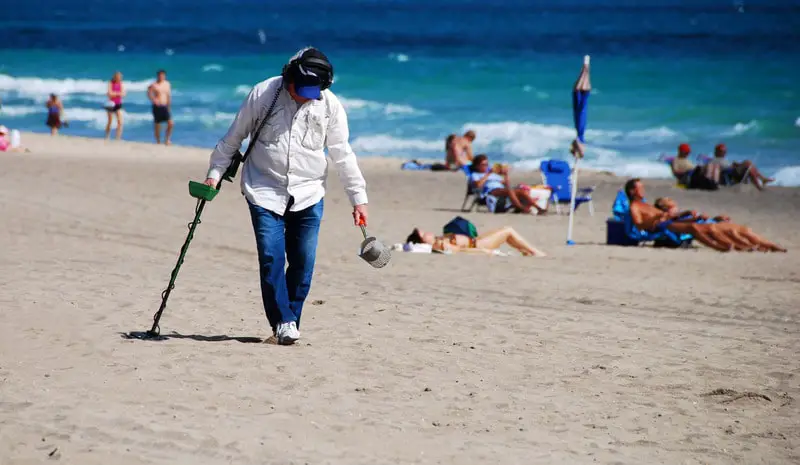
Now that you know what kind of questions you might want to answer, here are some of the things you are going to need for any typical trip. Make sure that any beach metal detecting session that you take on will include the following:
- Make sure you bring clothing suited to the beach. So, a pair of shoes that can handle sand – even wet sand – is going to be a good idea.
- While the beach might be warm on arrival, always pack some waterproof jackets and trousers to help keep you dry should the weather turn.
- Bring some kind of storage device for the metal detector, and also a cover for it. Even a simple plastic carrier bag can be enough to avoid the rain ruining your results.
- Always bring some kind of digging utensil, too. You’ll need to dig up the pitch that you find metal in, so you need to have at least a digging trowel or a spade in your collection.
- If you are going to keep your finds safe, we recommend bringing a spare bag with compartments. This means you can keep things like coins etc. safe and sound.
- While many people do this at home, to verify your find we recommend bringing some water and some brushes. This can be used to bush off debris for identification.
Make sure that you make a point of getting all of the above. For longer trips that might see you spending all afternoon and early evening on the beach, be sure to bring some food. Metal detecting can be quite a draining experience on the beach, so having some food to keep your energy levels high is very much recommended.
This will ensure more reliable and consistent results overall.
Digging Deeper: 9 Essential Tools Needed For Metal Detecting
Why Should I Go To The Beach?
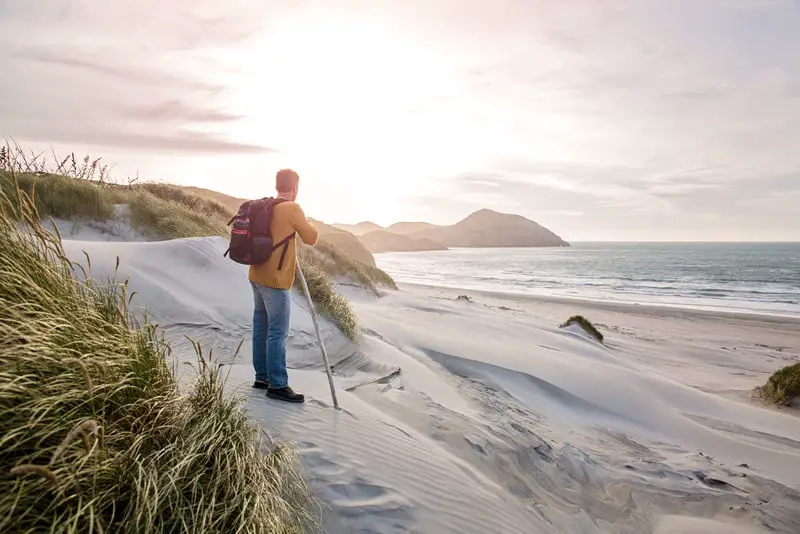
We know that you might have a few queries about why you should bother going for beach metal detecting. After all, not everyone lives near a beach so you might naturally favor hiking landscapes, forests, and the like. However, going to the beach is a brilliant idea as you can find some rather spectacular finds. Think about how beaches were used for centuries.
They were more often than not the landing spot for travelers, merchants, armies, and pirates. People would arrive in their hundreds, even thousands, and move across beaches. They might even choose to rest there and then move on, either to discovery or to war. So, imagine how many finds and pieces of metal that have fallen from all of these people?
Whether it’s a warrior slain in the field of battle to a nobleman who dropped a coin they never missed, the beach can be the home of many submerged yet special finds. Once something falls into the sand, it’s very hard indeed to make sure you can locate it once again. That’s just one reason why so many people will choose to get involved with beach metal detecting.
In short, it just offers a more unique opportunity. Sure, armies and the like have marched through hills and forests, dropping treasure as they go. But the beach? The beach is the perfect starting place for a special search. You really will shock yourself when you find out just how many items can be buried on the floors of the beach around the world!
So, if you are looking for a place to go that might offer something a bit more suitable, be sure to think about trying out beach metal detecting. For some, it offers the exact experience they had hoped for!
Making Sure You Are Permitted
One of the biggest issues with getting into metal detecting on the beach, though, stems from permission. Beaches are not often a place where you can just turn up and help yourself to the treasure and the gold that is lying underneath the sand.
Before you start metal detecting on any beach, it does pay – quite literally – to do some due diligence on land ownership. Imagine how disheartening it would be to find a special item worth five figures, only to find out that you have no claim to it as someone else owns the land?
That’s why finding out what kind of permit you will need is so important. Permits can be confusing, and it’s often down to the owner of the land to provide or deny a permit. So, you should always look to make sure you deal with the right person.
Private Beach
A private beach is often far less likely to have any kind of permission given to you; naturally, people who own their own beach are quite likely to keep it for themselves!
Therefore, you might find more luck if you try out a public beach. Many times, you will be given permission by the local authority albeit with stipulations.
You might be given time limits, find limits, or you might need to submit anything you find to the right kind of authority to have it verified and then claimed. It’s a bit of a challenge, and one of the most difficult parts of beach metal detecting is making sure you can play by the numerous rules.
It can be rather tedious, yes, but there really is no reason or benefit to simply not turning up and doing as you were asked. That’s why finding permission is better than assuming permission.
Getting To Grips With The Tide
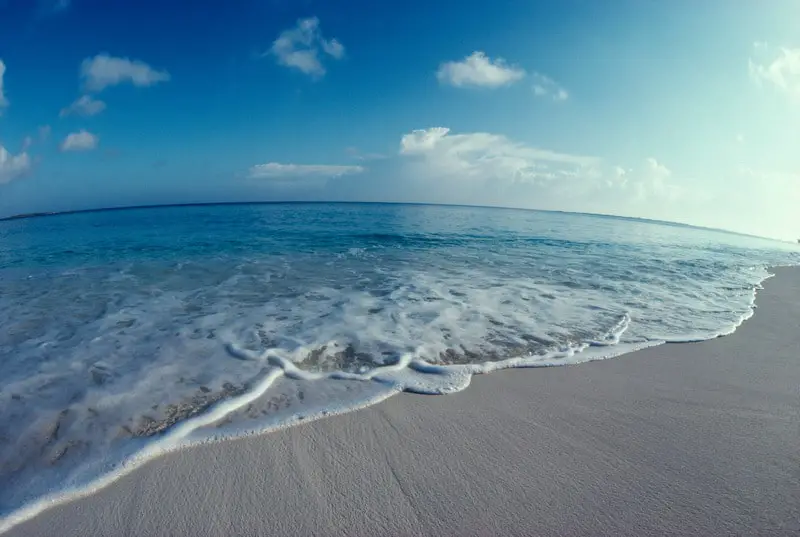
One thing that is totally different when it comes to beach metal detecting and normal metal detecting stems from the tides. Many do not realize just how vital the tides can be to make sure you can get a smooth experience. With the wrong tide, it can scupper the entire journey. With the right tide, though, you could find some mouth-watering discoveries.
The tides change all the time on a beach, and this can mean that you can turn up at any given time of the year and find new places to look over as well as places that are now unable to be accessed for any purpose. It’s for this reason that we highly recommend that you understand the tide as best you can.
The tide will adjust as time goes on, with two high tides and two low tides on any given day. High tide is when the sea is covering more of the land, and the beach naturally becomes smaller. Low tide means more of the beach is accessible and thus a place you can detect on top of.
However, high tides are great for refreshing the beach and reconfiguring where good finds are. With a high tide, it can more or less move everything around as it draws up and then draws back.
It’s a great solution for you to go back and take a look after high tide. Even if you feel like you have exhausted the beach, wait until the high tide swaps for low and do a second sweep. Who knows what you might find if you choose to do that?
Try and get there as early as you can after low tide, though, as you won’t be the only person beach metal detecting!
Should I Go Beach Metal Detecting During a Storm?

Yes, absolutely. Many people see a bit of wind picking up, or a fair amount of rain coming in from the sea and decide to pack up for the day. We literally cannot think of worse advice to give you, in truth. If you are looking to enjoy metal detecting, make sure that you go during the stormy weather as well.
Going to take a closer look is very much recommended as you simply never know what you are going to find if you choose to make that call.
Look for areas where a storm has done considerable damage, especially around the sand dunes. This can rip back large layers of sand and can show a greater sense of what is down below. This will mean that you can normally get a much stronger reading than you would have normally.
Where do you find the best discoveries?
The best places to look are for the smaller tighter areas on a beach. Many people go beach metal detecting and stick to the large, wide-open spaces. And while that might seem logical, it produces far less in terms of results than you might have hoped for.
That’s why we recommend that you look to make the correct discovery by making sure you turn up and look in the smaller nooks and crannies.
Often, look for small troughs of sand; these tend to be good places to look for. It’s a good place to finding treasure as it’s often just much more simplistic to work with. It’s also going to assure that you can get the assistance you require to make a deeper dig into the ground. In larger, wide-open spaces it can be hard to dig deep enough to find anything worth searching for.
Detecting Finds In Sand
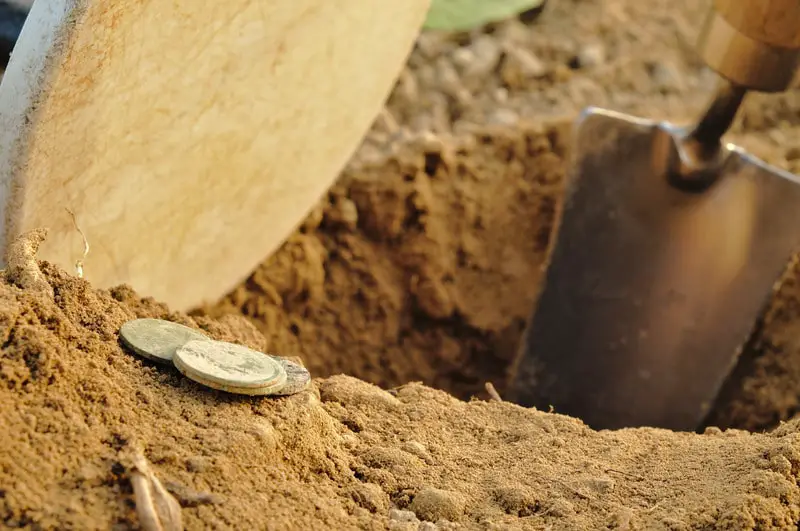
One thing you might be struggling with when it comes to metal detecting on the beach is finding something as you search. A good way to boost your chances of finding something is to look when beach parties and beach events will be taking place. Say it’s a nighttime beach rave.
Come back when the party is over, but before the morning beachgoers all turn up. You can find some pretty precious finds in the sand if you choose to come down after major public events and the like.
This will make finding items a bit easier for you, but it will also boost the chances of finding something of value. Always remember that once you have dug up some sand that you put it back in place, though. You don’t want to be the source of someone getting hurt on the beach because they fell down one of the sand dunes that you created!
Buying the Right Metal Detector
Make sure you always bring a metal detector made for the job, too. Too many people turn up with something that is either not waterproof or is more aimed at dealing with soil. Make sure you look for something that has extreme depth – a metal detector that is more depth-seeking is the tool you need.
It’s much more useful to pay extra and buy something with a higher frequency standard, such as the Garrett Ace 400 or the Makro Multi-Kruzer. The former is a more beginner-friendly tool, while the latter is a more complete tool that is suited to experts and those looking to make this more than just a hobby.
One thing that we recommend you do is to build up a collection of detecting tools for beach metal detecting. Start off with something for shallow water, such as the Makro Kruzer or the Garrett AT Pro. Also, be sure to look for something that is more suited for diving such as the Garrett Sea Hunter Mark II.
You will pay more for the above metal detectors than you would a normal entry-level detector. But that being said, you will be left with a device that is made for beach discoveries, so it will likely pay itself back sooner. The better the condition of your detector, the more likely it is that you can make the kind of discoveries worth finding!
The best beach metal detecting device is arguably the Garrett ATX, but it really does come down to personal choice. For any kind of beach metal detection, though, be sure to stay focused on looking for models that fat in with a particular style for more consistent, reliable results.
When’s The Best Time To Go To Beach Metal Detecting?
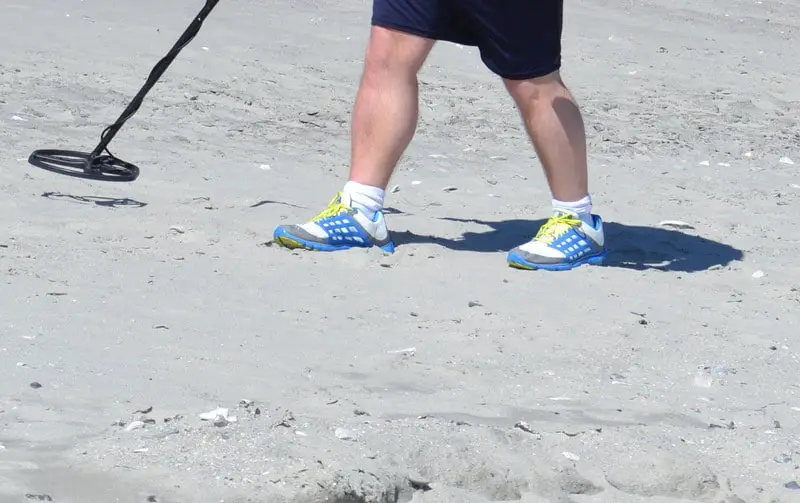
The best time that you would find to go and engage in some beach metal detecting really does depend on what you are looking for. A good thing to note is that if you do your beach metal detecting during summer, you should spend more time near the watery areas.
Areas with large water intake, especially after high tide, can mean many of the items dropped by beach-goers have been washed up and thus are ready to be collected.
You should try and make sure that you look to keep an eye on where people congregate most. If you can, keep an eye on the busiest parts of the beach and then return when the audience begins to dissipate.
You’ll be shocked at how much debris a large beach party can leave behind – much of it quite valuable. You aren’t just looking for relics when beach metal detecting, but items dropped only a few hours ago!
Detecting During The Winter
We recommend looking for drier areas during winter, as this is where most people will go. They’ll look for things like sand dunes and bonfire spots, where social groups congregate. Turning up after they have left is likely to result in some very impressive solutions and opportunities for discovery.
After all, you should be looking to make as much of this as you can. If you choose to come on down during the winter months, look for drier patches. If you come down during the summer months, look for those nearest the water.
Keep this in mind, and you should be a fair bit more likely to come up with some pretty impressive finds. It’s just about putting in the effort to work with the geographic and seasonal conditions that are provided!
Is Beach Metal Detecting Hard?
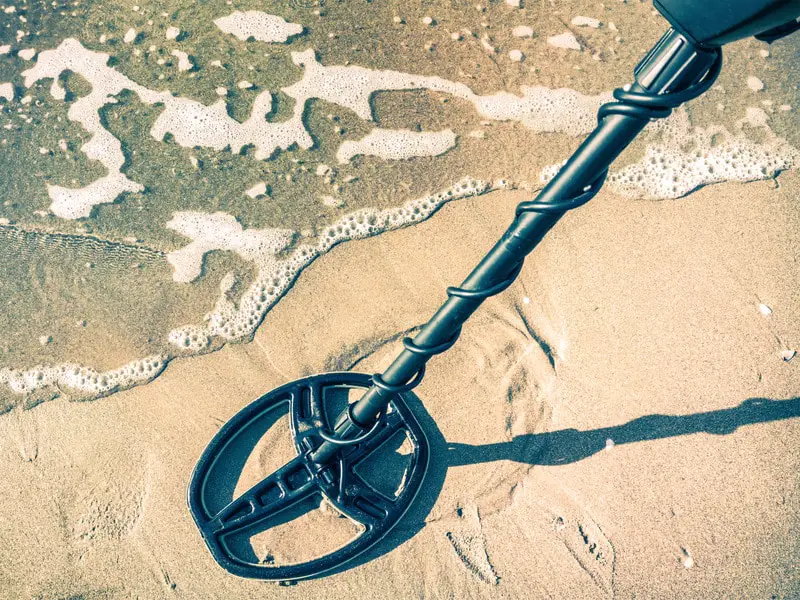
The hardest thing about going metal detecting on the beach is that you often find the sand is hard to deal with. The dry sand will simply fill back up as you dig it out, while wet sand is often likely to fill up with water. Annoying, right?
The only thing you can do really is to make sure that you work quickly. If you are working near the surf area, then you do have to work quickly and without any real sense of precision. The main problem you have is that your detected target could get swept out to sea if you are not fast enough to dig deep enough.
With drier sand, though, the best thing you can do is take your time and dig deeply yet slowly. Even try and find something to store the dug-up sand in until you are ready to put it all back.
The best thing that you can do is to look for sandy areas with little rocks and rocky areas. Little dunes like this are often hotspots for collecting treasure. Keep an eye out for rocky areas, particularly those within wading distance into the water during low tide.
Rocky Areas
You should definitely look to check out the right kind of rocky areas, as they can be the solution you need to find something genuinely. This is because unlike sand the rocks and the like will all keep items in place. They become trapped and stuck to the actual rock itself, meaning that finding them is going to become much easier.
As ever, you should look to come back to the same rocky areas when the tide changes. Who knows what hidden treasures previously inaccessible have been blown up against the rocks from the last time you checked?
Who Do I Return My Finds To?
If you are going beach metal detecting and you find something you think might belong to someone, you should try and hunt them down. It’s an ethical question, but if you find something that clearly looks like a wedding ring or similar, we recommend doing some local posting on classified ads sites, and through local metal detecting clubs.
If you cannot trace the owner then fair enough, at least you can say that you gave it a go. Don’t simply assume that ‘finders keepers’ applies, though; it can become a legal landmine.
I hope you enjoyed this guide and if you have any questions or comments please leave them below. Until next time Happy Treasure Hunting!

A great overall view of metal detecting,clear and easy to follow.
Thank you, Geoff! I’m glad you enjoyed the article!!